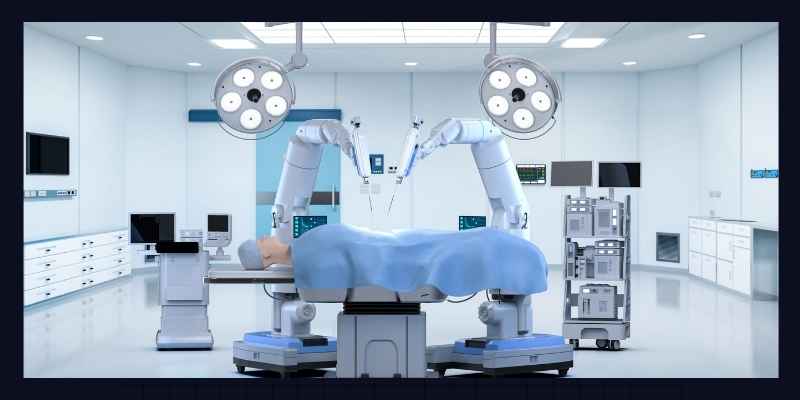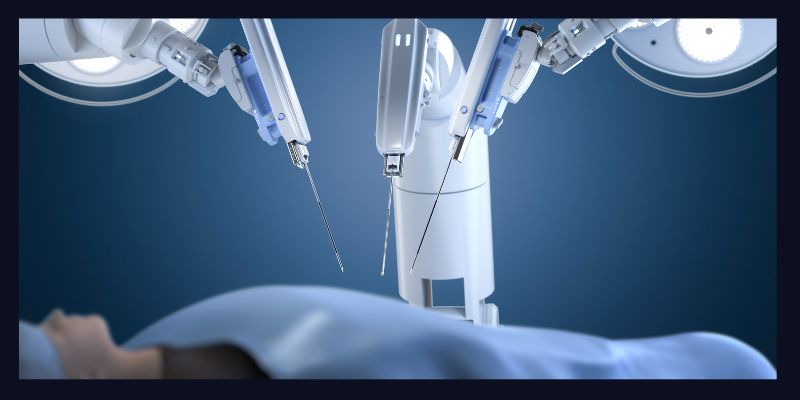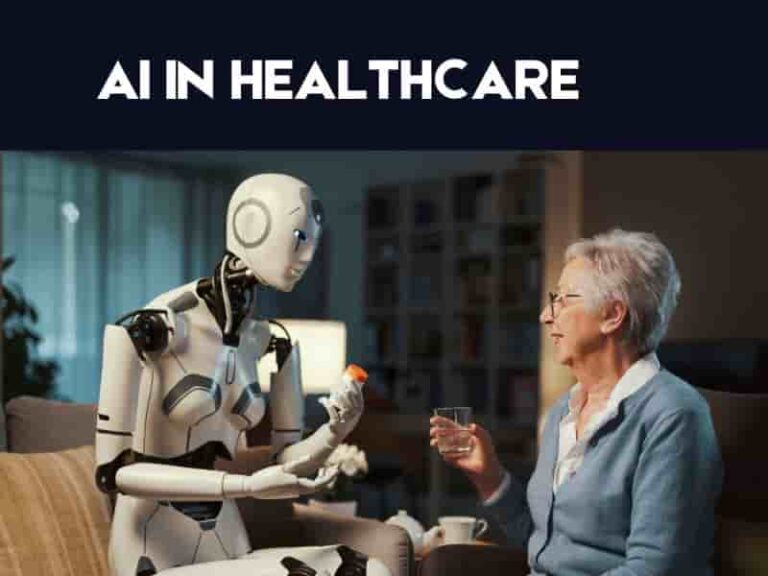Table of Contents
Introduction AI in Healthcare
The introduction of AI in Healthcare systems marked a new age of innovation. AI-powered technology can evaluate immense amounts of medical data, identify complex patterns, and even predict results based on past data. This makes AI important in fields like medical imaging, medication research, and patient care.
As healthcare professionals face more challenges to provide high-quality care to increasing numbers of people, artificial intelligence (AI) provides solutions that improve both accurate diagnosis and patient care efficiency. Although there are challenges and ethical considerations to consider, the advantages of AI in healthcare are apparent.
The Role of AI in Diagnosis
Diagnostics is one of the most promising uses of artificial intelligence in healthcare. AI systems, particularly those based on machine learning models, can analyze images from medical devices, Electronic Medical Records (EHRs), and other complex information with precision that sometimes exceeds the abilities of humans.

Medical Imaging: AI-powered systems can interpret radiological pictures such as X-rays, MRIs, and CT Scans with outstanding precision. These systems use machine learning algorithms to detect anomalies, identify early symptoms of illnesses such as cancer, and assist doctors in making more informed decisions faster. For example, AI is being used to detect early-stage lung cancer in CT scans with more accuracy than current methods.
Predictive Analytics: Artificial intelligence systems evaluate previous information to determine if a patient will develop specific medical conditions. This allows healthcare providers to act earlier, possibly stopping the course of chronic illnesses like diabetes or cardiovascular disease. Predictive analytics is also useful in hospital administration, helping predict patient intakes, staff requirements, and even future epidemics.

Natural Language Processing (NLP): NLP algorithms are capable of analyzing and processing unstructured clinical notes in EHRs, extracting useful insights and ensuring that important information is not ignored. This improves making choices by helping doctors to have a better understanding of the medical history of patients and make diagnoses that are more precise.
AI in Enhancing Patient Care
AI is also transforming patient care by increasing personalization, productivity, and accessibility. From virtual health assistants to surgery performed with robots, AI technologies are being utilized to improve the patient experience at every level of treatment.
The ability of artificial intelligence to assess genetic, lifestyle, and environmental data enables it to assist in the development of highly specific treatment programs. AI-powered algorithms believe how patients will react to different therapies, minimizing experiments and optimizing medicine prescriptions. This technique is especially important in fields like cancer, where personalized therapy may significantly improve outcomes for patients.
Telemedicine and Virtual Health Assistants: Artificial intelligence-powered virtual assistants aid patients with managing their health through offering reminders about prescription regimens, periodic checkups, and vital sign tracking. This type of support is especially useful for long-term disease management, since it allows patients to stay involved in their treatment plans from home. Telemedicine technologies powered by AI may also evaluate patients from home, providing timely treatments without the need for visits in person.

Robotic Surgery: AI-assisted robotic devices are now being used in operations to improve precision, shorten recovery times, and reduce mistakes made by humans. Surgeons use these technologies when performing minimally invasive surgeries, which are guided by AI algorithms that improve movement and decision-making throughout the operation.
Challenges and Ethical Considerations
While AI in Healthcare has huge potential to change healthcare, it also presents significant ethical and practical problems.
Data Privacy: AI systems rely on huge amounts of patient data, prompting worries about privacy and security. It is necessary to ensure that sensitive information cannot be compromised or misused. As AI usage grows, so does the demand for strict data governance regulations and strong Cybersecurity measures.
Bias in AI Algorithms: The data on which AI systems are trained determines their performance. If the data sets are insufficient or biased, the resulting AI models may perpetuate or worsen current disparities in healthcare. For example, certain AI tools for diagnosis have been shown to perform better in specific demographics than others. It is critical that programmers and healthcare providers cooperate to reduce bias and promote reasonable AI applications.
Regulatory Obstacles: The fast pace of AI research creates hurdles for regulators, who must guarantee that resulting AI systems fulfill both security and efficiency criteria. Authorities must strike a balance between innovation and patient safety, building rules that encourage responsible use of AI in medical facilities.
The Future of AI in Healthcare
AI’s participation in healthcare is expected to expand, potentially resulting in automated diagnostic systems, AI-powered virtual health networks, and faster AI-driven medication development.
In genetics, AI can scan huge quantities of data to detect genetic alterations and offer customized therapies. AI systems for mental wellness are evolving, providing early identification of diseases such as depression via behavioral and speech analysis.
In the future, artificial intelligence (AI) will work alongside healthcare professionals to help them make complex decisions, evaluate data, and provide customized treatment.
Conclusion
AI in Healthcare is clearly changing healthcare, increasing how patients are diagnosed and treated. Its applications include diagnostics, patient care, and forecasting, all of which help to customize and simplify healthcare. While issues such as data privacy and algorithmic bias must be solved, the future of AI in healthcare seems bright.
With advances in technology, AI will play a growing part in assisting medical professionals and improving patient outcomes. By embracing these advancements and removing any roadblocks, we could expect a healthcare system that is more accurate, efficient, and readily available to all.
FAQ’S
What is the impact of AI in Healthcare?
AI improves diagnosis accuracy, personalizes treatments, and streamlines hospital operations, enhancing the overall quality of patient care.
How is AI used in medical Diagnostics?
AI analyzes medical imaging, such as X-rays and MRIs, and processes patient data to provide more accurate diagnoses and predictions.
Can AI replace doctors in Healthcare?
No, AI assists doctors by providing data-driven insights and improving decision-making but does not replace the expertise and judgment of healthcare professionals.
How does AI ensure data privacy in Healthcare?
AI systems in healthcare must adhere to strict data governance protocols, including encryption and anonymization, to protect patient data.
Will AI in healthcare reduce healthcare costs?
Yes, AI can reduce costs by improving operational efficiency, automating tasks, and enabling earlier disease detection and treatment.




Interested
Thanks Keep in Touch!